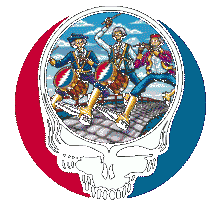Industry Uneasy With YouTube Craze

To me, like Archive.org, YouTube seemed to good to be true. Recently, YouTube got a ceast and desist order requesting they remove a video called "Hippie Temptation" (featuring the Dead) from the site.
EcommerceTimes has an article about YouTube and the Industry:
Industry Uneasy With YouTube Craze
Bootleg footage from concerts by top artists such as the Rolling Stones, U2 and Franz Ferdinand are available by the thousands along with recordings of pop videos and band interviews. A simple keyword search can unearth a wealth of classic clips featuring Kate Bush, Jimi Hendrix, The Smiths and Take That.
It is the latest entertainment craze to sweep the Internet. Thousands of amateur video clips, rare footage of music concerts and homemade film spoofs are now being uploaded every day to the video-sharing Web site YouTube for the enjoyment of millions of Web users around the world.
Allowing the public to watch and share clips for free, it has become an unprecedented platform for amateur filmmakers to show off their home movies.
However, music labels, film studios and television bosses are now cracking down on the site, and others like it, amid fears they are becoming a virtual breeding ground for pirated material.
Bootleg Footage
They claim video sharing is being used to dodge regulations designed to stop music and films being distributed over the Internet after sites such as Napster were forced to charge for downloads by the courts.
Bootleg footage from concerts by top artists such as the Rolling Stones, U2 and Franz Ferdinand are available by the thousands along with recordings of pop videos and band interviews. A simple keyword search can unearth a wealth of classic clips featuring Kate Bush, Jimi Hendrix, The Smiths and Take That.
More than 20,000 new video clips are sent in to YouTube every day and it attracts 15 million plays every 24 hours. Some films have attained cult status, spreading around the Internet faster than computer viruses. Long-forgotten footage has re-emerged as hugely popular entertainment after being posted by users.
The British Phonographic Industry insists all these videos breach copyright law and says they will "rigorously" seek to have them removed from Web sites with the threat of legal action against service providers who refuse.
A spokesperson said: "Our policy is to prosecute in cases of file-sharing of music and that would be the case where bootleg videos of concerts were also being illegally distributed. Record companies own the copyright of any filming done at concerts, and it is illegal to post such footage on the Internet.
"Tackling the illegal distribution of music as audio and video on the Internet is a priority at present and we will rigorously try to have the material removed."
Sharing War
The war against Internet sharing has gathered pace as broadband capacity has made it easier to share and download entire films and albums in minutes.
One YouTube favorite is a Rice Krispies advertisement from 1964 featuring an embarrassing jingle written and performed by the Rolling Stones. At the time, the band asked not to be identified as being involved when the ad was aired, but video-sharing has allowed Web users around the world to enjoy the fading footage for themselves.
Hollywood studios are concerned that clips from movies such as the "Harry Potter" films, "Memoirs of a Geisha" and the latest "Scary Movie" installment are all available along with segments from popular TV shows.
Earlier this month, NBC Universal forced YouTube to remove hundreds of clips from the site of a sketch from its "Saturday Night Live" show, and CBS News did the same in relation to a clip that had become popular.
A spokesperson from the Federation Against Copyright Theft said: "We monitor piracy online as well as physical materials, and it is a growing problem as technology advances."
The music industry has been leading the fight against illegal sharing since it took Napster, who produced one of the first file-sharing programs, to court two years ago and forced it to charge for legal downloads, but experts claim the music and film industry may struggle to have other more "creative" films removed.
Fighting Piracy
Filmmakers have dubbed songs over personal footage to create their own music videos while others have spliced sections of different films together to create new plots.
In one example, called "Brokeback to the Future," a pair of college students from Boston have combined scenes from Hollywood hit "Brokeback Mountain" with 1980s favorite "Back to the Future" starring Michael J. Fox.
The parody has attracted worldwide attention and spawned a series of copycat spoofs from films as diverse as "Top Gun" and "The Shawshank Redemption."
Dr. Richard Haynes, from Stirling University's Media Research Institute, said he believes file-sharing will see an increase in this kind of "video jockeying." He added: "These Web sites are designed to provide a platform for people to show off what they are recording, but they are open to abuse.
"The floodgates are open, as it is very problematic for the industry to stop this from happening -- particularly if the clips are being used by people creatively.
"If they have been spliced, dubbed and remixed, then it becomes extremely difficult in terms of ownership. The music industry is already rife with this, as lyrics are often used by other musicians and samples are used by hip-hop artists and DJs."



0 Comments:
Post a Comment
<< Home